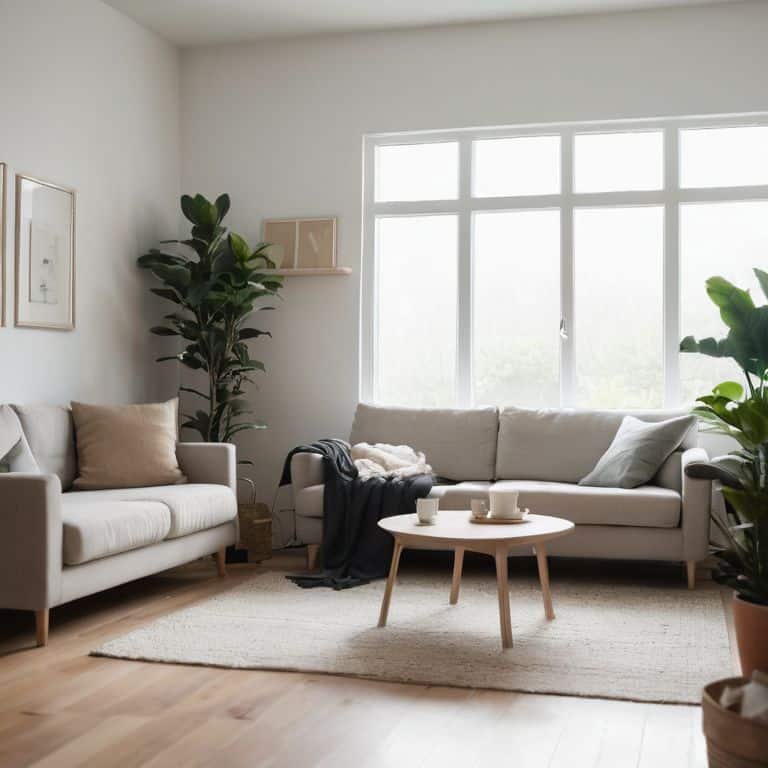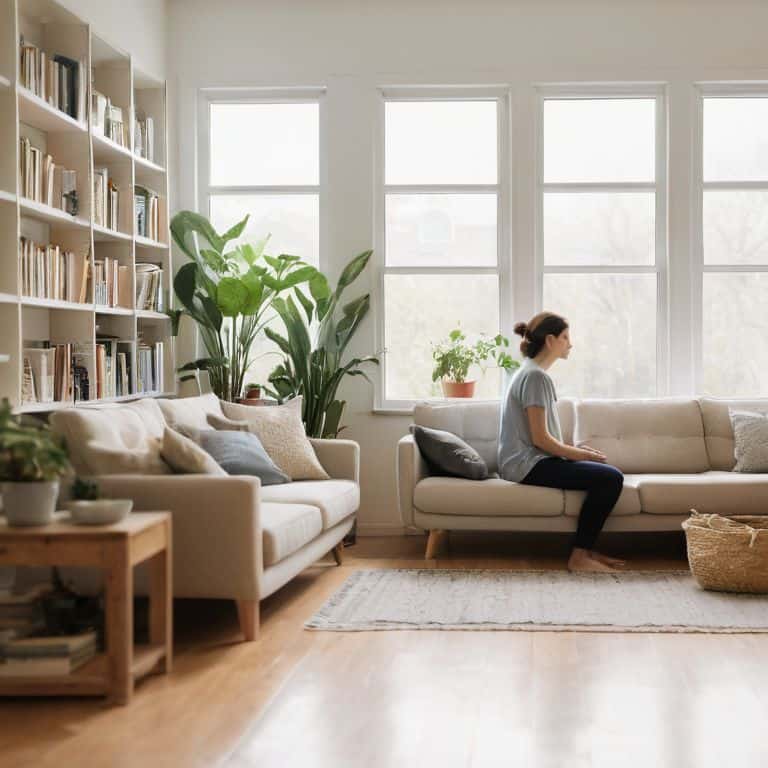I still remember the first time I realized how a cluttered home affects your mental health. I was working with a client who was struggling to manage their stress, and as we walked through their cluttered living room, I could feel the weight of their anxiety. The air was thick with the smell of old books and stale air, and the sound of cluttered chaos was almost deafening. It was then that I knew I had to help people understand the profound impact of their physical space on their mental wellbeing.
As someone who’s passionate about helping others create a sanctuary from the outside world, I want to share my knowledge with you. In this article, I’ll cut through the hype and provide you with honest, experience-based advice on how to tackle clutter and create a space that truly feels like a refuge. I’ll show you how to interview your belongings and decide what to keep, and provide you with simple, logical systems for organizing your space. My goal is to help you understand how a cluttered home affects your mental health and give you the tools you need to create a peaceful and organized living space.
Table of Contents
- Clutters Hidden Toll
- How Clutter Impacts Mental Health
- Decluttering for Improved Focus Breaking the Anxiety Cycle
- Minimalism and Stress Reduction a Direct Link
- 5 Ways to Break Free: Tips for a Clutter-Free Mind
- Key Takeaways for a Clutter-Free Mind
- A Sanctuary of the Mind
- Creating a Sanctuary: Beyond the Clutter
- Frequently Asked Questions
Clutters Hidden Toll

As I work with clients to transform their living spaces, I’ve come to realize that clutter and emotional well-being are intimately connected. The toll of a cluttered home can be subtle, yet profound, often manifesting as a sense of mental fogginess that permeates daily life. It’s as if the clutter outside mirrors the turmoil within, making it difficult to focus or find peace.
The relationship between our surroundings and our mental state is complex, but one thing is clear: organizing for mental clarity is a powerful tool for reducing stress and anxiety. By creating a sense of order and control in our environment, we can begin to quiet the mind and cultivate a deeper sense of calm. This, in turn, can have a profound impact on our overall emotional well-being, allowing us to approach life’s challenges with greater clarity and confidence.
As we explore the psychology of clutter accumulation, it becomes clear that minimalism and stress reduction are closely linked. By letting go of unnecessary possessions and embracing a simpler way of living, we can begin to break free from the weight of clutter that holds us back. This journey is not just about tidying up; it’s about creating a home environment that nurtures our minds and souls, allowing us to thrive in all areas of life.
Beyond the Mess Clutter and Emotional Well Being
As we delve into the relationship between clutter and emotional well-being, it becomes clear that living in a cluttered environment can have a profound impact on our mental state. The constant visual reminders of tasks left undone and the feeling of being overwhelmed can lead to increased stress levels and anxiety.
By recognizing the emotional weight of clutter, we can begin to understand the importance of creating a peaceful space that fosters calmness and serenity, allowing us to recharge and face life’s challenges with a clearer mind.
Organizing for Mental Clarity a Path to Serenity
As we delve into the world of organizing, it’s essential to understand that creating a serene environment is not just about tidying up, but about cultivating mental clarity. By assigning a purpose or a place to each object, we can begin to declutter not just our physical space, but also our minds. This process allows us to focus on what’s truly important, letting go of the unnecessary and embracing a sense of calm.
By embracing this mindset, we can start to see our homes as a reflection of our inner selves, and organizing becomes a therapeutic process. As we methodically go through our belongings, we’re not just getting rid of clutter, we’re creating a space that promotes relaxation and tranquility, allowing us to unwind and recharge.
How Clutter Impacts Mental Health

As I’ve worked with clients to transform their living spaces, I’ve witnessed firsthand the profound impact of clutter on mental clarity. It’s astonishing how a cluttered environment can cloud one’s mind, making it difficult to focus and think clearly. The constant visual stimulation of clutter can be overwhelming, leading to feelings of anxiety and stress. By addressing clutter and implementing simple organizing systems, individuals can experience a significant reduction in mental fatigue and improved emotional well-being.
The relationship between clutter and emotional well-being is complex, but one thing is certain: a clutter-free environment can have a profoundly positive effect on one’s mental state. By adopting minimalism and stress reduction techniques, such as decluttering and simplifying one’s surroundings, individuals can create a sense of calm and serenity in their daily lives. This, in turn, can lead to improved focus, increased productivity, and a greater overall sense of well-being.
As we explore the psychology of clutter accumulation, it becomes clear that our surroundings have a profound impact on our mental health. The home environment impact on anxiety is a significant concern, as cluttered spaces can exacerbate feelings of unease and discomfort. By recognizing the importance of decluttering for improved focus, individuals can take the first step towards creating a peaceful and organized living space that supports their mental health and well-being.
Decluttering for Improved Focus Breaking the Anxiety Cycle
As I work with clients to declutter their spaces, I’ve noticed a significant impact on their ability to focus. By removing distractions and creating a sense of calm, individuals can better concentrate on tasks and make progress towards their goals. This, in turn, can lead to a greater sense of accomplishment and reduced anxiety.
By streamlining their surroundings, people can break the anxiety cycle that often accompanies clutter. When our environment is organized, our minds are free to wander and explore new ideas, rather than getting bogged down in the stress of disorganization.
Minimalism and Stress Reduction a Direct Link
As I work with clients to declutter their spaces, I’ve noticed a significant reduction in stress levels when we adopt minimalist principles. By removing unnecessary items and focusing on what brings joy or serves a purpose, individuals can create an environment that promotes calmness and clarity.
Embracing intentional living is key to maintaining a clutter-free space and reducing stress. This mindset shift helps individuals prioritize what’s truly important, leading to a more peaceful and organized home environment.
5 Ways to Break Free: Tips for a Clutter-Free Mind
- Start small: Begin with one area or room at a time to avoid feeling overwhelmed by the task of decluttering your entire home
- Practice the ‘one touch rule’: Handle each item only once, making a decision to either keep, donate, or discard it to maintain momentum and reduce decision fatigue
- Schedule regular ‘maintenance sessions’: Set aside time each week to maintain your space and prevent clutter from building up again, reducing stress and anxiety
- Create a ‘maybe box’: Place items you’re unsure about in a box and set a deadline, such as six months, to revisit the item – if you haven’t used or thought about it by then, consider letting it go
- Focus on the ‘purpose or place’ principle: Ask yourself if each item has a purpose or a designated place in your home, and be honest with yourself about whether it’s truly needed or simply taking up space
Key Takeaways for a Clutter-Free Mind
By recognizing the emotional weight of clutter, you can begin to break free from the stress and anxiety it causes, and start creating a home that feels like a true sanctuary
Implementing simple, logical organizing systems can have a profound impact on your mental clarity and focus, allowing you to tackle daily challenges with renewed energy and purpose
Embracing the principles of minimalism and intentional living can help you cultivate a deeper sense of calm and well-being, and create a space that nurtures both body and mind
A Sanctuary of the Mind
A cluttered home is not just a reflection of a cluttered mind, but a catalyst for further mental chaos – by clearing the space around us, we can begin to clear the space within.
Nathan Reed
Creating a Sanctuary: Beyond the Clutter

As we’ve explored throughout this article, the impact of a cluttered home on mental health is a profound one. We’ve discussed how clutter can affect our emotional well-being, leading to increased stress and anxiety, and how organizing our space can be a powerful tool for achieving mental clarity. By recognizing the link between our physical environment and our mental state, we can begin to make intentional choices about the spaces we inhabit, and take the first steps towards creating a home that truly feels like a sanctuary.
So as you look around your own home, I encourage you to consider the potential for transformation that lies within your walls. Imagine the sense of peace and calm that could be yours, simply by creating a space that reflects your values and supports your well-being. It’s a journey worth taking, and one that I’m honored to guide you on. Remember, the process of decluttering and organizing is not just about tidying up – it’s about cultivating a deeper sense of connection to yourself, and to the world around you.
Frequently Asked Questions
How can I start decluttering my home without feeling overwhelmed by the task?
To start decluttering without feeling overwhelmed, begin by focusing on one small area at a time. I recommend starting with a single shelf or drawer, and then working your way up to larger spaces. This approach helps make the task feel manageable and allows you to see progress, which can be incredibly motivating.
What are some common emotional attachment patterns that make it hard for people to let go of clutter?
I’ve noticed that emotional attachment to clutter often stems from sentimental value, fear of loss, or guilt. People may hold onto items as reminders of happy memories or relationships, fearing that letting go will erase the past. Others may feel guilty about getting rid of gifts or items that still have use, even if they no longer serve a purpose.
Can creating a clutter-free home really have a lasting impact on reducing stress and anxiety?
I firmly believe that creating a clutter-free home can have a profound impact on reducing stress and anxiety. By removing distractions and chaos, you can quiet your mind and find a sense of calm. I’ve seen it with my clients – a tidy space can be a powerful tool for mental clarity and serenity.
